Get posts by email
Technology is the New Literacy
June 17, 2013
It's no secret that we own and use a lot of computer technology in our home. Computer technology is our family's livelihood. My husband is a computer programmer and web developer. We write blogs and we sell digital products.
We depend on the internet for everything from putting food on the table to downloading books to read.
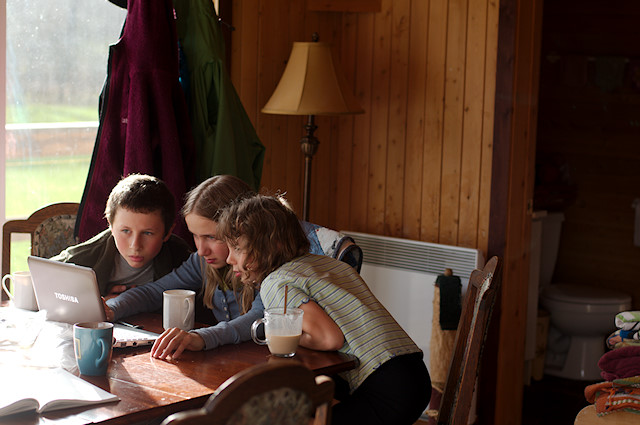
We have built a life dependent on computer technology, and so have many other people, whether they realize it or not. Computer technologies support every industry in our modern world. Some find this thrilling, others find it scary.
As a family with a bent for natural and simple living (we are creative with our hands, outdoorsy, and even minimalist in many regards) we are always striving to use technology in meaningful, not mindless, ways.
Our aim is to use the amazing resources available to support our family values and help us reach our goals.
As homeschoolers we believe technology is a fabulous tool for home education, education period.
Technology allows homeschooling parents to provide an excellent education for their children regardless of where they live. And even to some extent, regardless of income. (I say "to some extent" because you need some hardware, software and an internet connection, at minimum. But these are still cheaper and more versatile than many other education options available.)
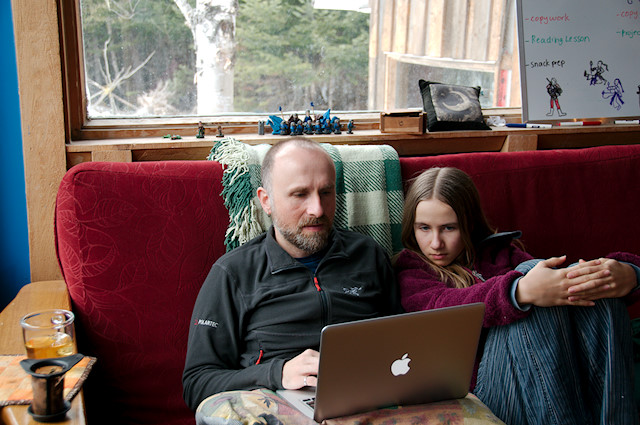
As our children grow, they are using more technology tools all the time. From the time they could reach the keyboard they've always had supervised access to our desktop computer. But that access was limited when they were younger. Limited by their reading abilities, their interests, and resource availability (the kids and I used to share one computer).
Also, when our kids were younger I was very intentional about "grounding them" in hands-on, tactile experiences; and more generally limiting their screen time.
My how things change in just a few short years. It started with Céline getting her own Kindle at the age of eleven. And since then there have been iPods and iPads and now individual laptops.
Céline is no longer a child and her learning and interests involve a lot of technology. The younger two are still children and use technology to a lesser degree than Céline. But because Céline is leading the way, as the oldest do, our younger two are exposed to more technology at their ages than Céline was.
I've been getting questions about what devices we use and why, what technology we allow in our home and at what ages and stages.
I'm happy to share more about what works in our home and our decision-making process around screen-time.
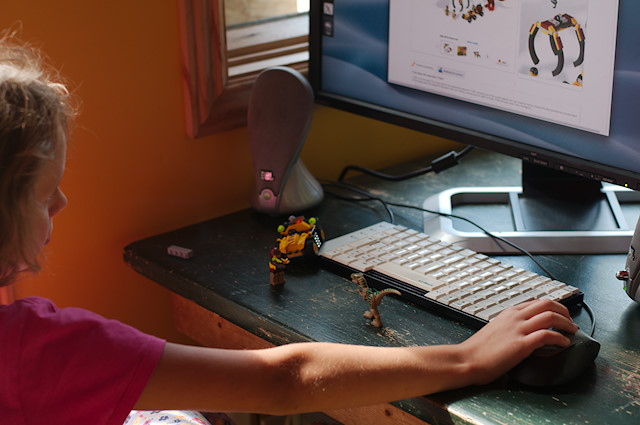
First off, I have to start with an assumption. And indeed this is the backbone, or our philosophy, as to why we want our children to have access to technology and to learn how to use it.
Technology is the new literacy.
Knowing how to read and write once separated the haves from the have-nots of this world. We believe access to technology and knowing how to use technology wisely will separate the haves and the have-nots of the future, if not so already.
This is the future we are raising and educating our children for.
Our world is getting increasingly technologically complex and our children are going to have to be comfortable in that world if they want to be successful in their adult lives. And it doesn't matter what they want to be successful in - music, art, writing, farming - all of it involves technology to some extent and we want to prepare our children for that.
Also, as homeschoolers we rely on technology to meet our needs in the here and now, not just as preparation for the future. Living in a French speaking culture and province we use technology to access English books. We use the internet to connect with other homeschoolers around the world (none in our neighborhood yet). We use computer programs and web applications to study and learn. Technology is a huge part of our homeschool.
A run down of what we use on a day-to-day basis
Our home is full of computers.
We have a Mac desktop with a large monitor. This is the all-purpose family computer. We use this for streaming video; Laurent uses this computer for his art; we use this monitor for family movie night, etc.
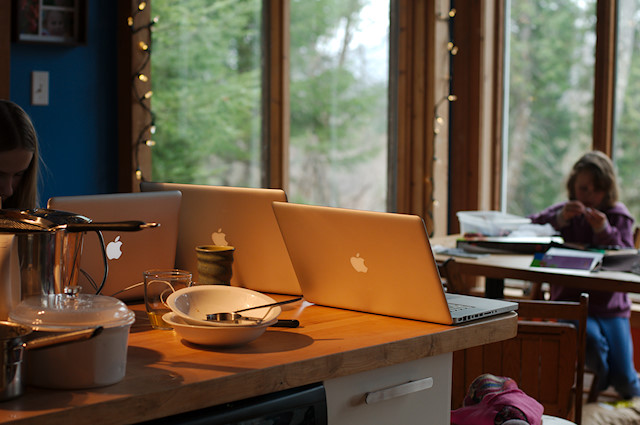
Damien and I each own a MacBook Pro for our work. I use my computer all the time for home management, recipe storage, photo editing, e-mail, as well as blogging and my paid work coaching and teaching. I'd be lost without my computer. And Damien could literally not support our family without his.
Céline owns her own MacBook Pro (13 inch) and Laurent and Brienne each own an iPad. Céline and I each also own a Kindle for reading books. Damien uses his own iPad for reading.
The point here is not that we have a collection of Apple products in our home, but that we have the tools that are best suited to our individual needs.
As a nascent high schooler Céline needs an all-around good laptop for her education and interests. She spends hours a day on her computer. Her current curriculum, which is a self-directed RPG project, is all computer based.
The computer is how she talks with her friends, does research, writes, reads, etc... It's her link to the world and is a critical component of her education.
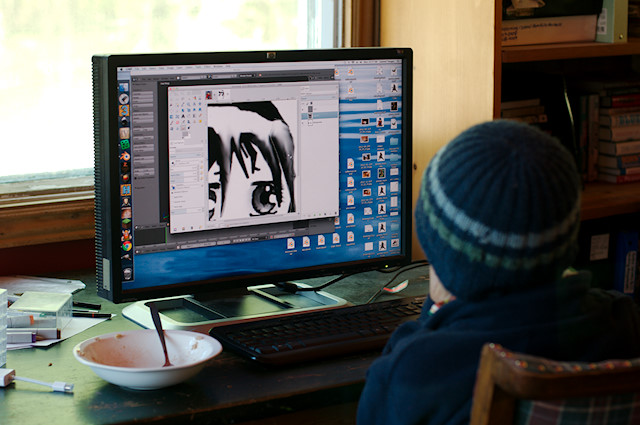
Laurent, aged 12, still only needs a device mainly for accessing the web, audio books, and apps. His favorite apps are guide books, animal identification at his finger tips.
An iPad serves his needs well. This is a new addition; up until this winter Laurent used an iPod for his personal technology needs.
As handy as his iPad is, Laurent is depending more and more on the desktop computer (that can run hefty programs) for creating art.
Ten year old Brienne is a budding writer, reads ebooks, listens to audio books and music, takes photos, and uses e-mail. An iPad serves her needs sufficiently. Her favorite apps are fashion and Barbie "dress-up" games. Even paper dolls have gone digital.
Our family also owns an Android smart phone, which we don't use as a phone but as a mobile device. The current favorite app for the kids is Stop Motion Maker.
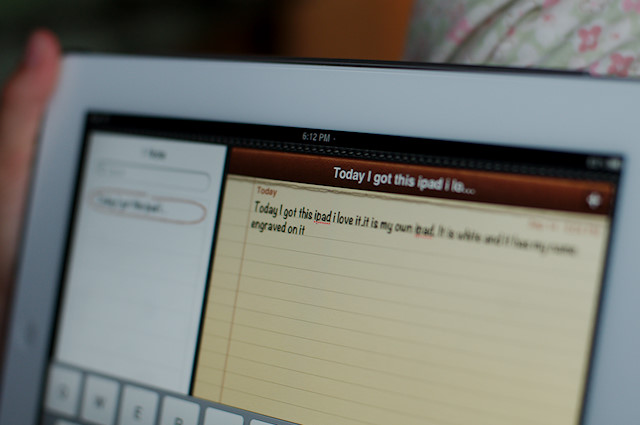
A Technology Strategy
We have a fairly thought out approach to why and how we introduce computer technologies into our home and our homeschoool. These are our guidelines.
- Technology is a tool
- Meeting the learner's needs & interests
- Learning the hard way
- Raising creators not users
1. Technology is a tool
Introducing computer technology into our home is not about "keeping up with the Joneses" nor is it about not being left behind socially. Just like buying a powerhouse blender for our kitchen, we acquire technology and learn to use it, because it's a tool in our lives.
A tool for learning, working, connecting and yes, playing. But a tool nonetheless.
This is an important distinction to make. Do we have this thing (computer, phone, blender) as a status symbol, to fit in? Or do we buy and use this as a tool in our lives. Every technology purchase we make goes through this filter. Is this a tool we need?
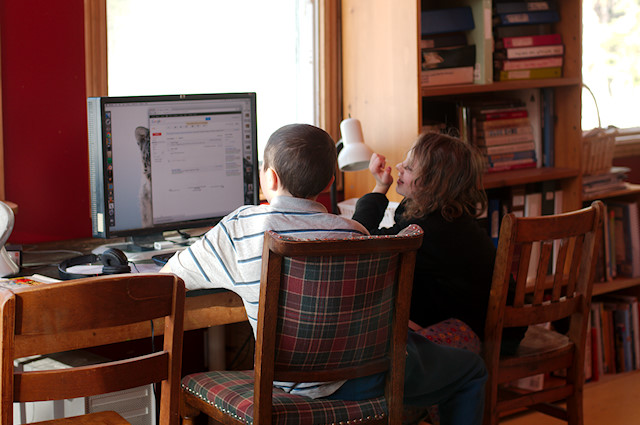
We have taken a "wait & see" approach with many technology tools and for the most part, we are not early adopters. Though Damien might be if funds permitted. (smile)
We have adopted technology tools into our home based by answering the questions: is this the right tool? and is this the right time? I feel in this way we have not rushed our children into technology acquisition just because it's popular, trendy, or whatever.
Céline spends a lot of time these days on the computer. Creating art in graphics programs, reading, researching (all her school work) and writing to friends. I had wondered when she would start writing in earnest.
Her writing has exploded now that she has a real motivating purpose - connecting with friends. The teen forum where she hangs out is like a collaborative, peer-led, and learner motivated creative writing class. (Story writing is popular with this group.) I'm delighted. Technology as the tool.
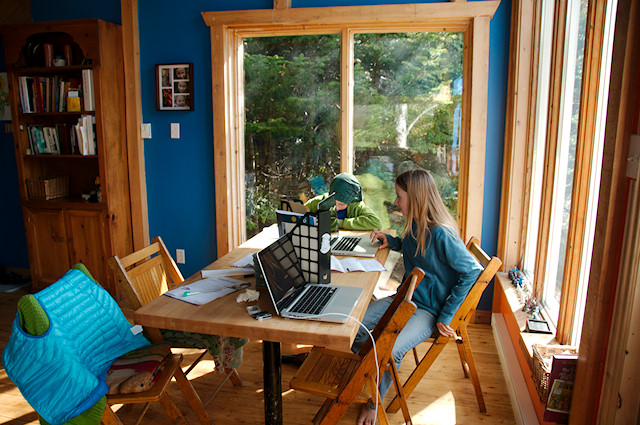
2. Meeting the learner's needs & interests
We don't have a "one size fits all" approach to raising children or homeschooling. Each of our children have unique needs, interests, and strengths.
From the time they were little they each have needed different discipline and motivation strategies and so of course as students and learners they need different tools.
Céline is a geek, Laurent is an artist, Brienne is a writer. This is not a pronouncement forever-and-ever-amen, so much as an encouragement of gifts we see in them. As individuals with different gifts they need different tools.
For example, Laurent needs tools to help him draw and make art. He also needs tools to help him learn to read, tools to access audio books, and tools to help him express his thoughts in writing. These are completely different than Céline's needs.
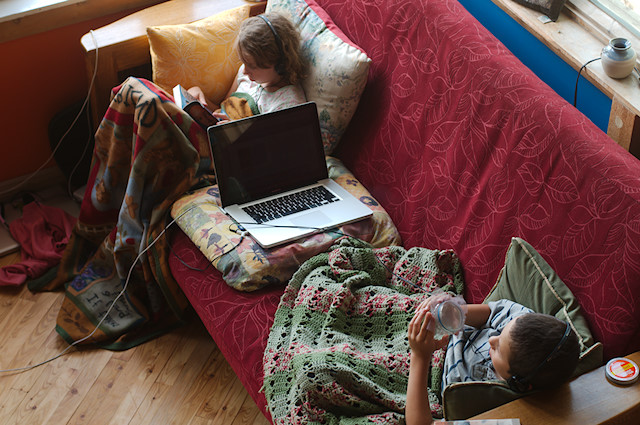
We use technology to support and meet the learner's needs and interests.
3. Learning the hard way
We don't hand our kids fancy devices and do-dads on a silver platter, i.e. they help pay. We don't make it too easy for them either. We want them to learn through the process of using technology.
When our children have a need we introduce technology that will meet that need but stretch them also. When Laurent needed a graphics program, we introduced challenging software for him to use, first 2-D and then 3-D. We don't raise the bar so high as to over-frustrate but we definitely raise the bar.
In Laurent's case, the graphic programs he uses are not the dumbed down, kid-friendly versions, they are professional. But it's amazing how much his intuitive mind can figure out in an atmosphere of no fear and lots of time.
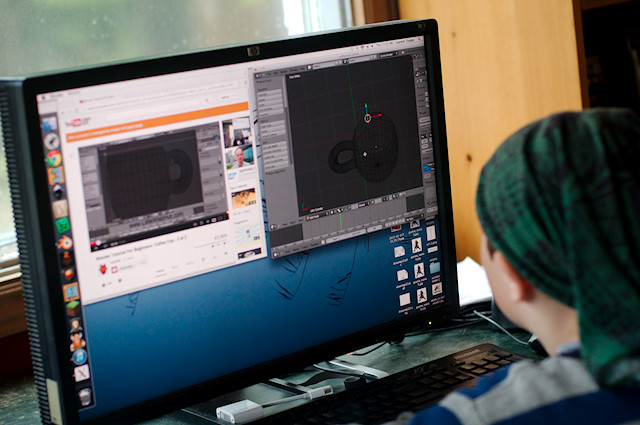
Fear of failure and fear of making mistakes hampers learning. A lot of adults have fear about technology. I don't want my kids to feel that way.
When Céline got her laptop last year she was responsible for its setup. She is responsible for all the downloading, installing, uploading, file sharing, etc. that goes on with her computer. Damien teaches her what she needs to know and she takes over from there. And then she teaches me! We are teaching her to be independent and solution-orientated with her technology use.
We don't do it all for our kids and hand them the technology "ready to use". As appropriate, we make them figure it out. And if they can't figure it out, maybe they're not ready for the tool to begin with.
4. Raising creators not users
Our goal is to raise our kids to be comfortable using the technology they need to meet their goals; and not just using but creating with the technology and designing technology themselves.
We don't want to teach our kids to be point and click users, we want to teach them to be think and create users.
We want to raise kids to become adults who make and create. Adults who solve problems, share ideas, and add meaning to the world. Computers are one of the big tools we use for creativity and problem solving.
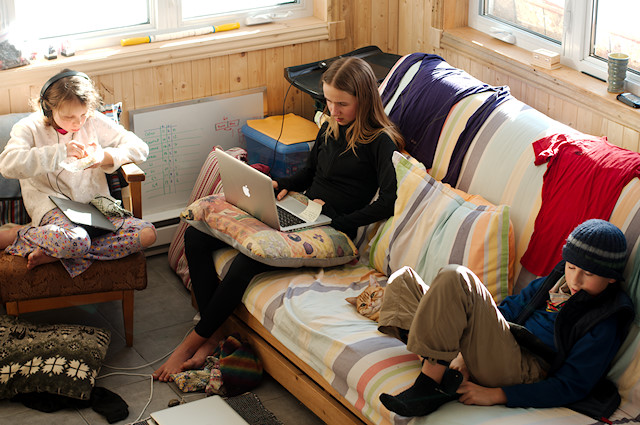
What about Social Media, Gaming & Security?
All of this we take on a case-by-case basis.
Some people are so afraid of what they don't understand, that they close themselves and their children off to learning opportunities, out of that fear. We don't want to do that; living our life in fear of the internet boogie men or whatever.
Social Media
Neither Damien nor I are huge social media users and so far our kids have no interest. Being homeschooled probably helps but we'll cross that bridge when we get there.
Céline spends a lot of her free computer time (time not set aside for her school project) on a moderated teen homeschool forum, hanging out. This is fabulous for her since she's an introvert, we live in the woods, and there are no homeschoolers within 3 hours of our home. I recommend this on-line group if you're looking for one.
Gaming
Our kids started playing computer video games just over a year ago. They were 12, 11, and 9 at the time. They only play a few. Some RPG's, a few "shooter" types, and they recently added Minecraft to the mix.
Gaming is something we set limits on, both in terms of the amount of time and the types of games we let our kids play. (They have unlimited access to chess and other similar games on the computer.) We don't have any gaming systems or consoles, we have computers and tablets and all the games are played on these.
I am not one of those homeschool parents who thinks video games are strictly evil, robbing our children of a "simple childhood". Mind you, video games didn't enter their childhood till rather late.
Nor do I think unlimited gaming is an ok thing for our kids.
One of my favorite (edgy & controversial) homeschool writers, Penelope Trunk, lets her unschooled boys have unlimited access to screens and video games. I find this fascinating and her posts on video games are always thought provoking.
Another approach is the "generous limits" idea as detailed in this fabulous article by Lori Pickert at Project-Based Homeschooling. And if you're in the mood for more, check out parenting with scarcity vs. abundance.
Here's our approach: We limit gaming. We don't limit computer use.
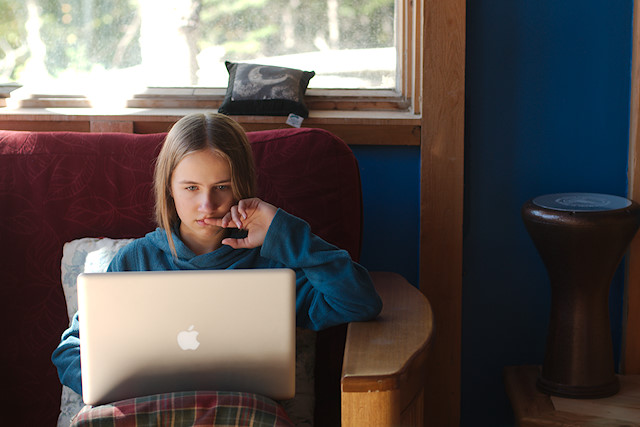
We use computers as tools; tools for creating, researching, reading, connecting, entertainment, etc...
The thing we limit is using computers simply as entertainment or mostly as a means of consuming something. We put up boundaries for ourselves around these activities and we are teaching our kids to do the same.
The gaming limits have been negotiated and re-negotiated over the past year and half. Currently, our kids can game for a long as they have been active outdoors that day. But because the day is so full with other work and play this gaming time is naturally kept in check.
I will be completely honest and say I have struggled with computer gaming limits, trying to find the best fit for our family. I've had to question and wrestle with a lot of my screen time biases.
Safety
With kids on the internet there are definite safety concerns. We have a few safety measures in place to reduce their risk of exposure to inappropriate material. The big one is all internet activity takes place in the company of other people. This is not a problem however since our kids pretty much hang out within an arm's reach of Damien or myself all day! By their choice.
We don't use any parental filters on our computers. We prefer to be physically close to each other all day and be sharing what we're doing on our computers. We use relationship with each other to monitor.
We have honest discussions with our kids about nasty stuff. We don't go into details of course but we share our concerns for their innocence and tell them what to do in the case of coming across something inappropriate (turn away, call us, we'll deal with it, and you're not in trouble).
With our younger two, because I still help them with spelling and writing, I am aware of nearly every internet search they do, "Mom, how do you spell Minecraft?" (Which they know by the way, but they ask me by default.)
As for "talking to strangers", Céline is the only one who chats on the web and we know where she's hanging out. She asks us before communicating on other sites.
So much of this comes down to relationship. Internet safety is largely about relationship with your children. This whole parenting gig comes down to relationship, computer usage is no different.
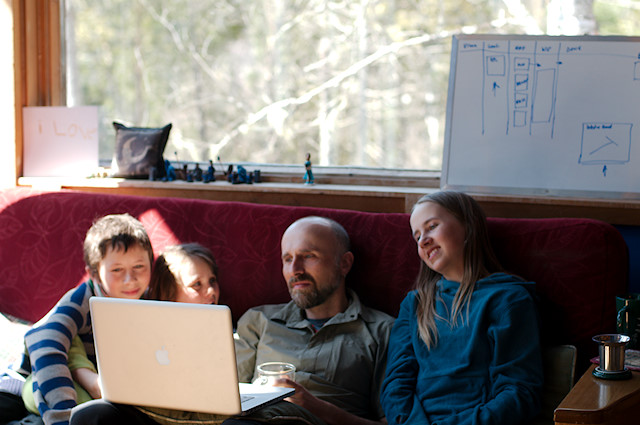
Our family is by no means a standard but this is how we manage technology and computer use in our home. Technology is tool and we use it in the context of close family relationship.
I tried to address the questions I've received but if you need further clarification I'm happy to respond in comments.
Filed Under
Resource Library
-

Tonya on June 17, 2013, 5:42 p.m.
Renee, Thank you! Mike and I read this aloud during lunch today to our just turned 13 year old and almost 15 year old with our nine year old listening as well. We are determined to change the negative culture we have instilled in our home about computer usage - with the older two boys (now 19 and 17) we would sometimes use it as a disciplinary measure - if you blank you will loose your computer for blank amount of time. I have always told them that the computer is a tool not a toy but never spent the time exploring those tools as neither Mike nor I are really techie kind of people. (although, we also make our living complelely by the blessings of the internet)
But now we are going to do what we can to get high speed and use the computer as an educational tool for the older children - classes, programs, etc.... Also thanks so much for the link to the homeschool forum as we live very rural and I think Isaac and Abby would really enjoy interacting more with homeschool teens.
Mike and I really like your idea of gaming time being equal to active outside time:)
My only question I had with your post was the subjective nature of you using the term have and have nots - I do think there are some abundantly happy and content people that live full lives without technology - yes, they are on the fringe, but it is possible, although you are probably bringing up a good point that that possibility may not be around much longer. Just yesterday at a festival when I took out my inexpensive, three year old digital camera to take a picture - I realized that it was nearly a relic - everyone seems to use their iphones now:)
Thanks again Renee.
Love, Tonya
-

renee on June 18, 2013, 7:36 p.m.
Tonya - thank you for calling me out on that and making me clarify here.
This is what I mean by haves and have-nots:
People who don't know how to make their ideas and dreams a reality are the have-nots. Have-nots is not a measure of your financial status, or even how much technology you use or don't use. It's a way of looking at the world and your ability (or in this case, your inability) to move through it and create the life you want.
It used to be (and no doubt in certain areas this still is true) that basic literacy was what enabled you make your dreams a reality.
The world that we are raising our children in, North America during a time of demographic and economic changes, requires more than basic school literacy - reading, writing, math, science, history. More than facts, figures and standardized tests.
It requires creative thinking skills, entrepreneurship, collaboration, etc. and a certain amount of tech savvy. I want our kids to have the means - a mindset and skill set - at their disposal to flourish in the environment they will come of age into and have to live and support families in.
The haves are those who have the skills, experience, and can-do attitude (mindset) that comes from having access to technology and not having fear about using it. The have-nots are those who are fearful, stuck in old patterns & resistant to change. They feel the world happens to them and they don't have the means to steer their own ship.
Hope that clarifies a bit what I mean.
-
-

Lori @ PBH on June 17, 2013, 5:47 p.m.
“The thing we limit is using computers simply as entertainment or mostly as a means of consuming something.”
that is actually the exact same approach we used! :) our “generous limits” were for “sloth” time (pure entertainment); we used computers freely as tools for making, creating, researching, and communicating.
your “think and create users rather than point and click users” philosophy aiigns with our “produce what we consume” philosophy — and that kind of deep learning and expression needs time and, as you point out, freedom from fear of failing/making mistakes. failure and making mistakes are a given — kids accept them much more readily when they know they’re going to have enough time to master the necessary skills and fix their mistakes.
without adequate time, children can’t become makers; they only have time to passively consume.
-

renee on June 17, 2013, 7:10 p.m.
Absolutely. Kids need time to create - digitally or otherwise. Time to explore, to make and fix mistakes.
I love that - "produce what we consume".
Lori, I have so enjoyed your posts on this topic recently. I've been writing this piece since early spring and your posts were so timely for me in my own thinking.
-

Lori @ PBH on June 17, 2013, 9:55 p.m.
thank you! :)
i don’t know why my comment came out in boldface. :P
-

renee on June 17, 2013, 10:05 p.m.
Because you were really trying to make a point : )
But I went ahead an unbolded it since it does kind of look a "shouting" comment. (I wasn't sure if you meant to do that or not. You know, maybe you were just passionate about your comment.)
-
-

Sarah M on June 17, 2013, 9:58 p.m.
I was also going to mention Lori's blog ( the past few months have just been right what I need to be thinking about and so, so good) and of course I knew you also liked to read Penelope's blog, as do I. All 3 of you are my 'gold star blogs' as in, the ones I set up ahead of time, and don't read until quiet time so I have full attention and can think them through, because they're so full of interesting links or meaty topics that I'm stretched by.
My kids are so young and the 'no screen time'/ADD screen scares/slow-childhood articles were just around the corner from where we were (and are still on-going?). That influenced me a lot, and I saw the value of it at the time (no screen-time at all for baby/toddlerhood) but now I'm having to re-think and re-adjust all of what I previously thought abut that, as my kids get a bit older and have interests in the computer. These things have really stretched me. It's uncomfortable, but I really, really appreciate the way you go through all these points. I'm uncomfortable with unlimited time, but I do want to give my kids a large gap of time to play (and they don't even know it but they're learning to read by these games, too!) so they don't worry about 'the timer going off', where they're on an edge of anxiety because there is little time. I so see your point as technology as the new literacy.
So much to think about!
Sarah M
-

renee on June 17, 2013, 10:17 p.m.
Learning at the edge of anxiety is such a stressful place to be and I don't want my kids to be in that position either.
Sarah, the challenge you face, and other parents of younger children, is just how ubiquitous screen time is and how to know where to draw the line. It was a bit easier when my kids were younger because there was just less screen time in general and that was just 5-10 yrs ago. I didn't use half the technology then that I use now. Much has changed. But change is not something to be feared and I'm not a fear-mongering sort.
I think unlimited time for younger children may not be the wisest. I too am concerned about the effect of screens on young children. Heck! I'm concerned about the effect of screens on me! These are issues we have to talk about and make wise decisions about based on our family values and knowing our own children and their needs, developmentally and intellectually.
I was just talking with Celine today (after she read this post - she laughed about her forum being creative writing - she just thinks it's fun to write stories and word play with friends, but me, always the homeschooler is looking for the learning in every activity!) about how I didn't use computers at her age. She can't even imagine.
Such is the world we live in, the only constant is change.
I hear you about the slow childhood movement. I want my children to have a childhood and have done my best to give them that (and those years are nearly done for us!). We value nature, creativity, making and doing with our hands. But we also live in a technological world and these devices do help us connect and create, and like you say, learn.
So much to think about - I agree!
-
-
-
-

Jess on June 17, 2013, 8:31 p.m.
Renee, thank you so much for be open and sharing this facet of your family's life. The idea of unlimited productive time and limited "sloth" time makes so much sense. Being clear that technology is a tool and not just for entertainment is just how I've been feeling but didnt know how to put into words.
-

Susan on June 17, 2013, 9:33 p.m.
Unlimited screen time is not a problem when parents guide their children in a heathy life style. When we take the ttime to ensure that our children eat healthy food and exercise. The problem is when the kids are just in front of a screen and not active. We limited because my one son would just sit all day if I let him. The other needs help in setting limits for himself.
-

renee on June 17, 2013, 10:20 p.m.
Knowing your kids is so important. We set up all sorts of parameters in our home. Parameters around food and eating (only bringing good stuff in the door and then you can eat most anything you want!), parameters around exercise and activity - it's required, parameters around mindnumbing activities, etc. We put these parameters in place for ouselves as much as our kids. And I think that's the important thing - what do we model for our children?
-
-

Penny on June 17, 2013, 9:54 p.m.
This is a BRILLIANT post. I'm so happy to see someone not vilify technology, but actually uplift it to what it can be, a positive influence when used in a balanced and apporiate manner.
I'm kind of in Tonya's place, getting ready to give the kids a lot more freedom to discover the joyful learning tool that technology can be.
My husband makes his living through technology (top of the line recording studio) - it has always been a conflict within me - his use of technology vs what other people say about computers and kids. I think you have helped a lot of people think things through today, and feel a lot less guilt! I also think that you've given some concrete help as people navigate this topic. I will be rereading again and again, and it's about time I ordered Lori's book too, even though my kids are older (11 & 15).
I applaud your words. A standing ovation, in fact. Thank you for sharing them!
-

renee on June 17, 2013, 10:36 p.m.
Penny, Damien and I have talked at length about this very issue you raise. Parents earning their livelihoods with technology but feeling the need to limit their kid's use of technology (and understandably).
I know the guilt of which you speak, and I know the struggle of trying to find the right balance. And in our case my husband always brings a different and welcome perspective to my protective-mama leanings. He wants to prepare our kids for the world they are coming of age into. I have appreciated his wisdom and guidance in this. Much of this post reflects his influence on me over these years (smile).
-
-

Jill Foley on June 18, 2013, 1:46 p.m.
Thank you - as my girls get older and more aware of technology, your words will give me a lot to think about. It's also given me a lot to think about in terms of my own usage of technology!
-

Jason Elsworth on June 19, 2013, 5:52 a.m.
We don't want to teach our kids to be point and click users, we want to teach them to be think and create users.
This seems like the key to me. However, it is easier said than done and more complex that it might first look. Doug Rushkoff always seems to have something interesting to say about technology. I have been meaning to read his last two books Present Shock and Program or be Programmed.
-

renee on June 19, 2013, 11:34 a.m.
Totally right. Easy said than done. Haven't heard of that author before.
-
-

Lee on June 20, 2013, 9:03 a.m.
Renee, thank you for (yet another!) thoughtful and though-provoking post. We also have a mini-Apple store in our home and everything has a purpose and use! Just wanted to chime in with our experience with our oldest, now 13. We gave him an older laptop when he was 9. He had already learned quite a bit about Scratch, and used it to build projects and interact with the online community. At 11, he started with Minecraft - perfect for Legomaniacs like him. We let him play without restriction, and he has progressed from building locally, to building on multi-player sites, to playing games on multi-player, to working as an administrator for a friend's server. Then we gave him a year of server space for his birthday, and he is constructing his own gaming experience on the Minecraft platform. This is engaging him on many levels - planning a strategic game, designing a unique, attractive environment, learning Java to code his own "kits", figuring out marketing and pricing so it will be self-sustaining cost-wise, building the Wordpress site and forum to support it, Paypal, etc. He has become completely self-directed in his learning at this point, since neither of his parents know Java! Of course his writing, spelling, and ability to communicate online have exploded as a side effect.
I'm not sure this will work with my younger - their personalities are too different. But she improved her math skills and her spelling significantly through educational game play on the iPad, so technology is working for her in different ways.
Thanks for the references, off to check them out now!
-

renee on June 20, 2013, 11:06 a.m.
I love that story. Thank you for sharing your experiences with Minecraft.
-
-

Wendy on June 21, 2013, 4:06 a.m.
Such a timely post, Renee. Ever since I read Lori's post at PBH on abundance vs. scarcity, I've been thinking about this topic almost constantly. We have carefully guarded our younger children's screen time (ages 4 & 1) from day one--no TV, etc. whatsoever, and, until recently, no computers/gaming, etc. What becomes challenging is that we also have a 14 year old and a 16 year old, and their needs need to be addressed too; not to mention the ways in which I constantly use technology throughout the day. After my four year old taught himself to read beginning at age 3.5, (all sight, no phonics), I began to see the need for him to learn how to associate sounds, etc. with the letters and words he was reading. I could see no point in making an active 4 year old sit still for drill and kill in phonics when I had an engaging, interactive computer game that could accomplish the same goal with songs and humor. I still feel tremendous pull between feeling guilty and relaxing my "standards". I so appreciate you sharing your family's proactive approach towards technology--it's clarified many things for me. Thanks!
-

Marisa - Grace Mothering on June 22, 2013, 2:33 a.m.
The way your use of screens has evolved with your children's growth has mirrored our path almost exactly. Thanks for your thoughts!
-

karen knapp on June 22, 2013, 10:54 a.m.
When can we expect the parent classes to teach our kids about computers for those of us who are technologically challenged? Damien teaches your daughter, your daughter teaches you!! Love this! I know little...can keep a blog sort of but my husband uses one at work and only at work or for one game he plays at home...barely uses email...... He knows nothing, I know little and I want my kids to learn because all they know now is how to be a user!!! So let me know when the class....how to have computer creators not users....starts!!! :) Have a blessed day!
-

Susan on June 24, 2013, 3:17 p.m.
This blog makes me want to sit down with you and ask a lot more questions. I feel as though because I do not use technology that much I have not been a very good example to our kids.... I wonder if that can change. Thank you for posting this. It has really caused me to think and view this subject in a whole new light. We are not using technology to our advantage. I think it is mostly my lack of knowledge that causes me to fear it and so I am not able to teach it safely to our kids. How can I email this to my husband... (see I am so limited... and it frustrates me.)
Thank you again.
-

renee on June 24, 2013, 4 p.m.
Susan, I don't think you should worry about being a bad technology example to your kids. Getting along with a minimum of technology is probably a better example than having it consume your life and always checking your facebook, or whatever.
And each family is different. We value technology and think of its place in our kids' education because it is so important for our livelihood and is something that Damien strongly identifies with and has since he was Celine's age. We have friends who strongly identify with music, the outdoors, service, growing their own food, community etc, and those are the values they teach their children. And this is of great benefit to their children. Those children will have skills and experiences our children will not.
So, don't feel bad that our aren't a tech-savvy person passing this skill onto your kids. When you teach kids to pursue their interests and to not be fearful in general - of change, or things they don't understand etc. they will pick up the technology when they need to. It's a mindset more than anything.
This is especially true because technology, computer stuff especially, changes so fast. It's not about learning to use certain programs, it's about learning how to access resources and tools to help you meet your goals.
And if you would like to "sit down and talk" both Damien and I are available for coaching (smile) on the subjects we write about.
-

Susan on June 24, 2013, 9:15 p.m.
Renee
I really appreciate your quick and thoughtful response. I have been so convicted all morning. In fact one of my 18 year olds is registering with teen homeschool hang because of your site. I am very glad to have a place to express their thoughts and talk to other homeschoolers. Currently they use pin cute things etc. but I can tell they enjoy finding others who like similar things. Anyway, thank you for your encouragement.
I appreciate your offer to answer my techy questions. I will try to formulate intelligent ones.
I have to run my girls to their work now. So until next time,
Susan
-
-

Sarah on July 1, 2013, 9:31 a.m.
"So, don't feel bad that our aren't a tech-savvy person passing this skill onto your kids. When you teach kids to pursue their interests and to not be fearful in general - of change, or things they don't understand etc. they will pick up the technology when they need to.It's a mindset more than anything."
Yes! I was just going to comment that, or a much less eloquent version. Anyway, I think that is very very true. I think, that as you said in other responces in the comments, that technology gives people incredible tools and enables them to do many, many things... but I don't think those skills are necessary. Yes, they are good on a resumé (I've learned that you should show what programs you can run, so it can directly affect employment), but what's really important is being able to learn quickly, be flexible, and be comfortable with not knowing.
I am right between Gen Y and Gen Z... (b. 1996) so this stuff definitely applies to me! But I don't love technology and I am quite bad at learning how to use it. But I am good at being uncomfortable with not knowing things, so I hope, at least, that that will be enough. (Also, while teachers certainly should be tech-savvy as much as possible, in my opinion, the jobs of both therapists and teachers--the two professions I am interested in--are based on relationships.)
-

how to make an app for android on July 19, 2013, 10:08 a.m.
I think this is one of the most important info for me. And i am glad reading your article. But wanna remark on some general things, The site style is ideal, the articles is really excellent : D. Good job, cheers
-
-

Catherine Forest on June 25, 2013, 12:58 a.m.
I am with Penny! I applaud you for this post! It is great to see a conscious, health and outdoor oriented family not vilify technology and gaming... and trust the relationship with the children, especially! Damien and yourself are such amazing parents and you have built such an amazing relationship with your children, you are right there with them, accompanying them. It is so beautiful to see. Wow!
You can subscribe to comments on this article using this form.
If you have already commented on this article, you do not need to do this, as you were automatically subscribed.






Kika on June 17, 2013, 5 p.m.
We currently have three computers, soon to be 5 (although I would be happy to retire our dinosaur desktop). All three of my kids also have ipods. Some of our laptops (two of them) are free second-hand, one of the new ones will be an Alienware laptop - great for gaming- that my son will buy himself and use for post-secondary. My kids must buy their own ipods or use our gift budget to apply toward the cost and pay the rest with their savings. When younger my kids have a 1 hr media limit/day for games/movies but they use them freely for audios, art projects, etc. My oldest does play some violent games like Call of Duty but had to wait till he was 16 to play these and we still have strict boundaries for what exactly is played/watched - there are some things that are a no-go in our home. But I don't monitor his time - he regularly does school work while responding to texts, watching a you-tube video and reading an article (generally related to gaming) or even a movie in another screen all at the same time! Yikes!
Budget is a huge concern for me in this regard - I don't want to totally be out of the loop with technology and yet haven't felt justified in buying much newer technology for myself... though I'm constantly weighing out pros/cons of various gadgets and may break down and get an iphone next fall. I love the simplicity of my own tv-free childhood but that just isn't life today and I agree that our kids must be computer literate.
I don't worry much about safety actually. We have discussed and set some general guidelines and my son helps me screen media for his sisters b/c he does a far better job of it than me.